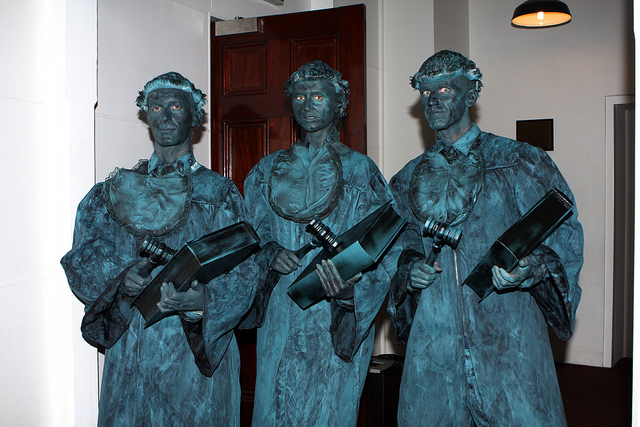Judges and select committees: a developing accountability culture
The specific scenario in which select committees seek evidence from a judge who has chaired an inquiry generates a lot of heat and light. But Patrick O’Brien indicates that the research he conducted with Robert Hazell shows the practice of judges giving evidence to parliamentary committees has been widely accepted as a positive and productive form of engagement. What is more, it creates opportunities for dialogue and for judicial accountability.
When is a judge not a judge? Lady Justice Hallett carried out a public inquiry into the ‘On the runs’ scheme in 2014. In its report on the same issue in March 2015 the Commons Northern Ireland Affairs Select Committee commented rather sternly that
‘we chose not to summon Lady Justice Hallett to attend, but we consider it to be a regrettable discourtesy to Parliament that she declined our initial invitation to give evidence to the Committee, especially as she had not acted in a judicial capacity when carrying out her review‘. [at para. 11]
Is a judge who chairs an inquiry acting as a judge, or acting as an inquiry chair? Judges, concerned about the implications of being drawn into disputes that are often highly politically charged, tend to believe that they are acting as judges and that their reports should speak for themselves. Parliamentary committees can find this attitude defensive and frustrating. Several years ago the Commons Cultural, Media and Sport committee ran into a similar conflict with Lord Justice Leveson in relation to evidence he gave as chair of the inquiry into phone hacking.
The specific scenario in which committees seek evidence from a judge who has chaired an inquiry generates a lot of heat and light. However, research I have done with Robert Hazell suggests that such ‘judge-led inquiry’ sessions, despite the problems that may attend them, make up only 5% of all evidence sessions these committees have with judges. The reality is that the vast majority of judicial evidence sessions are uncontroversial. The practice of judges giving evidence to parliamentary committees has been widely accepted as a positive and productive form of engagement by both judges and parliament.
For our research, we created a database of all written and oral evidence by judges to parliamentary committees between 1979 (the creation of the select committee system) and 2014. We found 418 records in total, 296 of which were by serving, salaried UK judges. What the data reveal is that there was a big increase in judicial appearances over the last decade. Roughly 70% of our records are post-2003. There is now a strong culture of judicial evidence to parliamentary committees, and official guidance and emerging conventions and understandings between parliament and the judiciary shape this culture (see the remarks of Mr Justice Beatson). What explains the cultural change in the early 2000s? On the parliamentary side, there was no dedicated committee to shadow what was then the Lord Chancellor’s Department until 2003. The Commons Justice Committee (as it is now), created in 2003, accounts for by far the largest part of our dataset, with 100 records. Also significant are the Lords Constitution Committee (created in 2001) and the Joint Committee on Human Rights (also 2001). There have also been changes to the legislative process that have seen more pre-legislative scrutiny, a process to which judges as expert witnesses can make especially useful contributions.
On the judicial side the significance of 2003 should go without saying. This was the year in which Lord Irvine was sacked rather unceremoniously and Downing Street unilaterally announced a slew of constitutional changes, including the abolition of the office of Lord Chancellor and the creation of a Supreme Court. Judges felt ambushed by these unannounced changes and voiced their concerns in every way they could, including to parliamentary Committees. Judges gave evidence on what became the Constitutional Reform Act 2005 (CRA) in relatively large numbers. My view is that this was transformative. Having given a lot of evidence in connection with the CRA and related changes, judges simply got used to it. The practice continued at the same rate, although the conversation moved on to other topics. Judges had always had an unusual degree of interaction with politics through the presence of the Law Lords in parliament and the constitutional chimera that was the Lord Chancellor, so this cultural change did not require an enormous leap for either judges or parliament itself.
What value do these sessions have? They create opportunities for dialogue and for judicial accountability. In all forms, these evidence sessions involve dialogue in the most basic, literal sense between judges and parliamentarians. In as much as these face-to-face encounters help to oil important personal and institutional relationships, they are valuable in themselves. These encounters help to sustain a relationship of trust between judges and parliament. But the dialogue also has more practical and immediate benefits parliamentary committees have an obvious interest in the judge’s perspective as independent expert on the enforcement of the law by the courts, or the potential problems with proposed legislation. Judges benefit from the opportunity to raise issues of concern directly with parliament.
Accountability is perhaps a more difficult concept in this context. ‘Accountability’ is traditionally associated with the political sense of the term, connoting blame and resignation (sacrificial accountability). Clearly there are good reasons why judges should not be accountable in this sense for their work in the courtroom, and especially for their judgments. An important result of the changes brought in by the CRA is that the judiciary themselves now have leadership, managerial and budgetary responsibilities that previously fell on the Lord Chancellor. The Lord Chief Justice in England and Wales now heads a large organisation with around 30,000 judicial staff (including magistrates). It is appropriate that judges should account for their leadership and for their stewardship of public resources just as any other significant public organisation would do. In respect of administrative and non-core activities – strategic planning, budgetary spending, estate management and so on – it is important and appropriate that judges should offer some form of accountability (in this context, explanatory accountability). It is appropriate that judges should have some of these conversations in public.
Select committee appearances offer judges, parliamentarians and the wider public an arena for judicial accountability; a safe constitutional space. Contrary to the hint in the report of the Northern Ireland Affairs Committee, judges cannot in practice be summoned to appear before committees, and cannot be made to answer questions if they choose not to. But when they do, they make themselves accountable in some way to politicians and the wider public. Committee proceedings are (normally) public and are available in transcripts and videos online. This offers at least a partial riposte to the frequent claim that judges are unaccountable. Not all evidence sessions deal directly with judicial leadership and administration – most deal with the judge as expert witness on the operation of aspects of the legal system – but for those that can this accountability is something valuable and to be encouraged. The Lord Chief Justice has made it clear in his remarks that ‘[i]ncreased responsibility cannot but be matched by increased accountability’ (para. 47).
What are the risks? The risks to judges are relatively minimal. Committee members can ask any question they like, without restriction, but judges do not have to answer. Judges are rarely the subject of hostile or critical questioning, and need not answer questions of this kind or any other kind (we found that 1-2% of questions asked by committee members are of this kind; similarly 1-2% of questions are not answered by judges; there is some, but not complete, overlap in these two categories). Judges must always remain aware of their red lines – questions they regard as out of bounds in principle – and they must stick to those boundaries. This can be easier to say in abstract than to do in the context of an evidence session, and judges do sometimes allow themselves to be pushed further than I suspect they would like to be. In general, however, the committee room offers judges a safe constitutional space in which to make themselves voluntarily accountable. If anything, indeed, the risk is that committees can be too deferential towards judges for the encounters to be of any value. Committees clearly value evidence by judges: their reports cite evidence by judges at twice the rate of other witnesses. Properly managed, these encounters are valuable to both parliament and the judiciary.
This post originally appeared 7 September 2015 on the UK Constitutional Law Association blog and the Constitution Unit blog. It is based on a presentation given to a conference on ‘The Paradox of Judicial Independence’ on 22 June 2015. It represents the views of the author and not those of Democratic Audit. Please read our comments policy before posting.
—
 Patrick O’Brien is a Fellow in the Department of Law at the London School of Economics and joint author of The Politics of Judicial Independence in the UK’s Changing Constitution (Cambridge University Press, 2015).
Patrick O’Brien is a Fellow in the Department of Law at the London School of Economics and joint author of The Politics of Judicial Independence in the UK’s Changing Constitution (Cambridge University Press, 2015).






 Democratic Audit's core funding is provided by the Joseph Rowntree Charitable Trust. Additional funding is provided by the London School of Economics.
Democratic Audit's core funding is provided by the Joseph Rowntree Charitable Trust. Additional funding is provided by the London School of Economics.
Are judges on inquiries now accountable to Parliament’s select committees? A developing culture suggests Yes. https://t.co/PZi9jpC3ir
Judges and select committees: a developing accountability culture. https://t.co/KSN4itJNVx
Judges and select committees: a developing accountability culture: The specific scenario in which select commi… https://t.co/Bz4Lzdp63H
Judges and select committees: a developing accountability culture https://t.co/PZi9jpC3ir
Judges and select committees: a developing accountability culture https://t.co/ayzCBGw2JE https://t.co/DTiH33YYlm